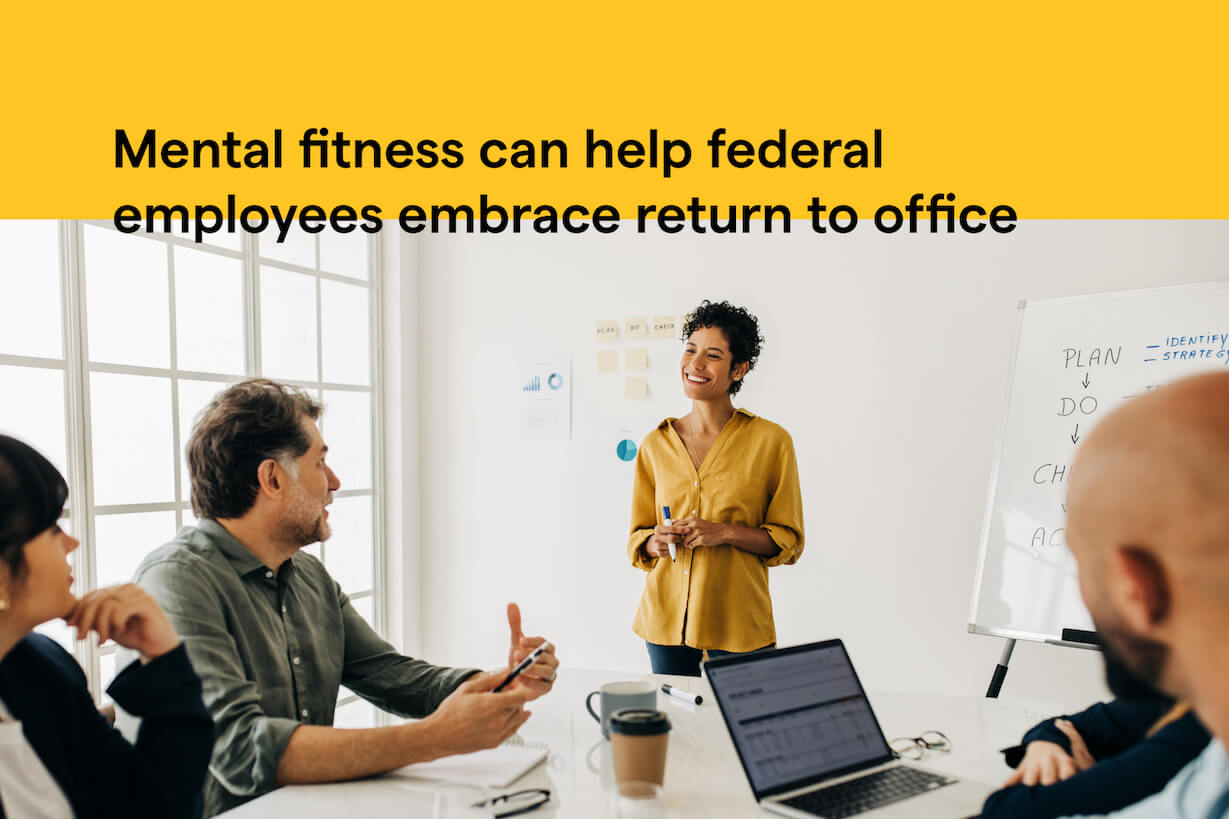
Individual
A self-facilitated program to boost your mental fitness for personal and professional growth
This website will offer limited functionality in this browser. We only support the recent versions of major browsers like Chrome, Firefox, Safari, and Edge.

Select the experience that fits your needs

A self-facilitated program to boost your mental fitness for personal and professional growth

A self-facilitated mental fitness program with exclusive pricing for 2 to 25 individuals

Explore coach-led mental fitness programs with workshops tailored to your organization
Mental Fitness

The world of work has undergone a seismic shift recently, with telework becoming the norm for many federal employees. As more federal workers return to the office, a new challenge arises: How can federal employees smoothly transition to in-office work after an extended period of remote work?
The answer lies in the realm of mental fitness. Mentally fit individuals can better navigate change, manage stress, and approach challenges with resilience. A recent initiative to revitalize federal employee assistance programs has already taken precedence. It, too, will play a vital role in improving employee wellbeing and easing tension around the return to the office.
The initiative guides a more comprehensive approach to improving federal employees’ wellness and productivity. In addition, the guidance calls for supporting initiatives that extend beyond the workplace, including access to counseling, dependent care, conflict resolution, and other critical services for federal employees.
Returning to the worksite after an extended period of remote work can be a challenging experience for anyone, and this holds for federal employees as well. The federal government’s call to scale back telework has sparked concern among some federal workers amid a new climate of uncertainty.
For many, the comfort and flexibility of working from home have become deeply ingrained, making the thought of returning to a structured worksite environment seem daunting. Employee concerns range from logistical aspects, such as commuting and readjusting to office dynamics, to emotional concerns regarding health and safety.
Mental fitness refers to the psychological and emotional resilience that enables individuals to cope effectively with stressors, challenges, and environmental changes. When federal employees return to the office, they may face a combination of factors contributing to increased stress levels, including a backlog of tasks, adapting to new policies, and reestablishing working relationships.
Mental fitness training can aid federal employees in transitioning back to the workplace by enhancing their resilience, focus, and overall wellbeing. Mental fitness training improves the ability to manage stress, adapt to change, and maintain a positive mindset during transitions and challenges. These improvements result in increased productivity, teamwork, collaboration, and engagement.
For federal employees, mental fitness training can provide the psychological tools and strategies to navigate reintegration challenges. Beyond the transition back to the office, mental fitness plays a vital role in maintaining a healthy work environment. Mental fitness enhances wellbeing and productivity in the following areas:
1. Stress management: Returning to the workplace can be stressful, as employees may face an increased workload, new responsibilities, or changes in their team dynamics. Mental fitness techniques help employees manage stress effectively, reducing feelings of overwhelm and anxiety.
2. Adaptability: Federal workplaces are subject to frequent policy, procedure, and technology changes. Mental fitness enhances an individual’s adaptability, enabling them to quickly adjust to new circumstances and learn new skills, thus improving their ability to thrive in a changing environment.
3. Confidence: Employees might experience a dip in their self-confidence after a period of absence. Mental fitness practices encourage employees to nurture a growth mindset, renewing their confidence in their ability to turn challenges into opportunities to grow.
4. Emotional regulation: Returning employees may encounter emotional challenges as they balance work demands with personal needs. Mental fitness improves emotional regulation, helping employees to manage challenges and prevent burnout.
5. Resilience: Bouncing back from setbacks is crucial to returning to the office. Employees develop a resilient mindset through mental fitness training to effectively cope with challenges, setbacks, and failures.
6. Communication: Effective communication is essential when rejoining a team in person. Mental fitness practices improve communication skills so employees can express themselves clearly, actively listen to others, and collaborate more effectively.
7. Focus and productivity: Returning employees might need help to regain their focus and productivity. Mental fitness techniques strengthen key mental muscles, allowing employees to complete tasks more efficiently.
8. Work-life balance: Achieving a healthy work-life balance is essential for sustained performance. Mental fitness practices encourage employees to set boundaries, manage time effectively, and better allocate energy in both work and personal life.
9. Positivity: A positive mindset can significantly impact an employee’s overall experience upon returning to the office. Mental fitness training enhances optimism, enabling employees to approach challenges with a positive mindset and calm, clearheaded action.
10. Overall wellbeing: Mental fitness improves wellbeing at work and home. When employees build mental fitness, they experience increased happiness, reduced burnout, and a higher quality of life.
A structured mental fitness training program helps federal employees improve wellbeing, performance, and relationships across all areas of life. The following approaches can also empower leaders and employees to cultivate mental fitness for a successful return to the office:
1. Practice mindfulness: Set aside time to practice mindfulness, even for a few minutes each day. This practice can enhance positivity, reduce stress, and improve focus.
2. Set goals and visualize success: Set clear goals for the return to work journey. Foster a positive mindset and establish a clear path to success with visualization exercises.
3. Establish self-care routines: Practice self-care through proper nutrition, regular exercise, and adequate sleep. These factors play a significant role in mental wellbeing and happiness.
4. Build support networks: Connect with colleagues and seek opportunities to build support networks in the workplace. These connections can help alleviate isolation, create a sense of belonging, and increase psychological safety.
5. Seek continuous learning: Foster continuous learning by seeking opportunities for skill development and personal growth. This can boost self-confidence, adaptability, and engagement.
When mental fitness takes center stage, employees become more adaptable to change. By incorporating mental fitness practices into their routines, federal employees can better navigate reintegration challenges, manage stress more effectively, and boost wellness at work. Federal leaders play a crucial role in creating an environment that supports mental fitness and employee wellbeing, ultimately leading to a more productive and harmonious federal workforce.
Visit this page to learn more about the power of a mental fitness training program for public sector teams.

